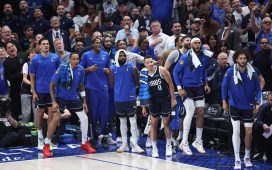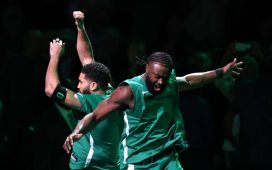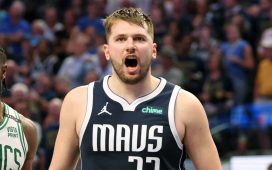Can I say anything or should I wait?
For Slovenian basketball fans, that line has become common courtesy on mornings after Luka Dončić plays. As Dončić has steered the Dallas Mavericks to the Western Conference finals for the second time in three years, his countrymen have rallied behind him once more. Everyone is talking about him, and television ratings in the country are spiking again.
But because Slovenia is seven hours ahead of Texas, those broadcasts air overnight. This fandom for the Ljubljana-born superstar is shared by the common nationality but experienced with very different routines. So over morning espresso, people make sure that another fan is caught up before continuing the conversation.
“If I know I’ll have the time, I just don’t open my phone, I don’t go on any social media, I do not talk with anybody,” said Luka Štucin, the chief editor for Arena Sports, Slovenia’s largest sports broadcast company. “If someone says, ‘Did you see the game?’ I’m just, like, ‘Shut the f— up!’ Because I haven’t watched the game.”
Tilen Lamut, the Slovenian announcer who replaced Štucin on these overnight broadcasts a few seasons ago, has experienced first-hand this season’s Mavericks journey — and the subtle differences in Dončić’s role within it. Slovenia has had an unconditional love for Dončić since he proved himself as an 18-year-old during the country’s 2017 EuroBasket championship run.
This postseason, however, has been much more difficult for Dončić. He started slowly against the LA Clippers in the first round before spraining his right knee, the effects of which carried over to the second-round series against the Oklahoma City Thunder. He’s had at least three other minor ailments appear on injury reports during this postseason run. He hasn’t always been the brilliant basketball player Slovenians have come to expect.
And because this country has so rarely wanted to find fault in Dončić, Lamut sometimes absorbs the blame.
“As a commentator, you’re a sh—y commentator if they don’t play well,” said Lamut, describing feedback he received in the opening round. “Everyone wants Luka to do well and have success so much, (they) basically forget that bad games can happen. That he can have a bad game.”
That scrutiny speaks to Slovenia’s Dončić obsession. There are thousands who do watch his games live, staying up late or waking early. They will do so again as Dallas opens its Western Conference finals series Wednesday night against the Minnesota Timberwolves.
Iztok Franko first started writing about the Mavericks for the Dallas-based D Magazine several years ago, but the Ljubljana resident has earned a larger Slovenian following since joining Arena’s studio shows previewing Mavericks games and announcing two seasons ago. While basketball is Slovenia’s second-most popular sport behind soccer, he’s still surprised by how many people watch Dončić: neighbors, hairdressers, acquaintances he hasn’t heard from in years.
“The camera guy in the studio said, ‘I wake up at 5 a.m. before work and then I just fast-forward and catch up by the fourth quarter or so,” Franko said. “So every person, I think, has their own unique viewing experience.”
Unlike past postseasons, however, there’s been a new theme in the way Slovenians have talked about Dončić: What’s wrong with him?
“To see a different type of playoffs is a little bit new,” Franko said. “The struggles, which are obvious in certain games, you don’t often see (from) him. We forget, with him, that he’s a player who can look terrible in one game and in another can look right back to himself.”
There’s no wrong way to support Dončić — no one cares if a 9-to-5 worker can only watch his highlights in the morning — but rarely has that support been anything but unconditional. Because Slovenia has just two million people, the country has always viewed its athletes as ambassadors for national pride. When the Mavericks failed, it was easy to blame someone or something other than Dončić: his teammates, his roster construction, the opponents, the officials.
Last year, Dončić was ejected from the Slovenia national team’s FIBA World Cup elimination game against Canada for arguing with an official. He flashed the money sign at FIBA executives as he exited the court.
“The Slovenian people show a lot of frustrations, because of the whining, because he’s not returning to defense,” Štucin said. “He talks to referees a lot. And we’re not allergic to it.”
At the same time, Štucin — and many other Slovenian fans — agreed with their countryman.
“But we also thought the refereeing was brutally, brutally bad,” he said.
This postseason, as Dončić’s teammates have often carried him, has finally sparked what Lamut sees as self-reflection within the Slovenian fandom. Even Dončić’s biggest fans couldn’t excuse performances like Game 4 against Oklahoma City, where his 6-of-20 shooting and excessive arguing over calls contributed to the team’s defeat despite leading by 14 in the second half.
“The argument (blaming teammates) was not there anymore,” Lamut said. “Everyone had to accept that Luka could have a bad game. Even if I call him out for having seven turnovers, I don’t get as much criticism anymore.”
It’s why Lamut’s favorite Dončić game in this postseason thus far was the ensuing Game 5 win against the Thunder, one in which Dončić came out with a noticeably different approach. He reminded himself, he said afterward, that basketball was the game he loved. He stopped complaining and simply played.
“He was playing with a smile on his face,” Lamut said. “And he was the right Luka.”
Just as Dončić is learning to trust himself, many Slovenians are learning to trust his teammates. Players such as P.J. Washington and Derrick Jones Jr. are becoming household names in Slovenia, and Lamut described a shared feeling that Kyrie Irving was the team’s MVP in the first round.
In that respect, Dončić’s father, Saša, has become the calming voice for both matters. Saša, the sporting director of the Slovenian Basketball Federation and a decorated former player himself who has joined the television studio shows alongside Franko and Štucin for the past two seasons, has struck both announcers with his always calm demeanor, especially in instances it contrasts to his son’s.
“I said to him a few times, ‘How the hell aren’t you pulling your hair out? How the hell aren’t you bickering about the referees?’” Štucin said. “(Saša says), ‘I know the way he plays. I know what he thinks when (I) see him.’”
Saša’s serenity also stems from his belief in his son’s new set of companions. After the first game Dallas played with new acquisitions Washington and Daniel Gafford, Saša surprised Franko and Štucin with a bold prediction:
“We were laughing at him when he said (after) the first win after the deadline: ‘See you in June.’”
As long as Dallas at least extends this West finals series against the Timberwolves to six games, Saša will be right.
And his total confidence, now more contagious among fellow Slovenians, partially explains the country’s renewed and evolved Dončić fervor. Historically, Slovenians root for their countrymen more than the local teams on which they play. They all remember the country’s support for Anže Kopitar, the captain for the Los Angeles Kings, when he helped them win the Stanley Cup in 2012 and 2014. Similarly, Slovenia was once known for its alpine skiing. Today, without standouts in either sport, its attention has shifted much more to cycling, where Tadej Pogačar won the 2020 Tour de France — winning again one year later — while Primož Roglič finished one spot behind him.
As Slovenians sense something special about this Dallas run, the support has swelled again to include almost the entire country. It’s due to Dončić that the Mavericks are Slovenia’s favorite team, and that support for him still transcends that of the team. But this time, Štucin said, it does feel different from before.
“We see Dallas like a Slovenian team,” he said. “(Slovenians) are talking to me, (like), did you see the game? Did you see the way we won?”
(Top photo: Milos Vujinovic / SOPA Images / LightRocket via Getty Images)





